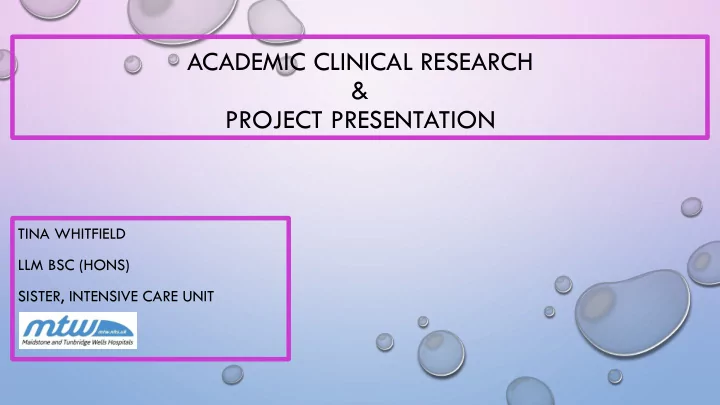

ACADEMIC CLINICAL RESEARCH & PROJECT PRESENTATION TINA WHITFIELD LLM BSC (HONS) SISTER, INTENSIVE CARE UNIT
2000 JOINED A GENERAL ITU UNIT WITHIN A FOUNDATION TRUST 2003 ITU COURSE COMPLETED 2005 STARTED LLM IN MEDICAL LAW AND PRACTICE 2007 SECONDMENT WITH TRUST RISK & LEGAL DIRECTORATE
2007 COMPLETED MASTERS 2008 -2014 2014 COMPLETED RETURN TO PRACTICE 2015 JOINED ITU AT
WHAT’S RESEARCH GOT TO DO WITH IT?....GOT TO DO WITH IT? • Health Education England (HEE) and National Institute for Health Care Research (NIHR) offered a fully- funded clinical research programme to nurses and allied health care professionals with the University of Kent • Provided opportunity for a new challenge! • Able to maintain clinical practice – they paid for my time • Develop and lead own research project • Future career development
LET’S GET THIS RESEARCH STARTED…… • Delirium is strongly associated with increased hospital mortality. Evidence suggests a relation between delirium in the intensive care unit and long term cognitive impairment. (Salluh et al 2015) • Occurs in 30% of emergency (non-elective) ICU admissions. (NICE; ICU steps; www.patient.info) • Prevalence of delirium reported in medical and surgical ICU cohort studies varies from 20% to 87%. (Girard et al 2008) • Up to ONE THIRD of cases have been shown to be preventable. (Fleet and Ernst 2011) • Significant resource and financial implications associated with delirium leading to longer critical care/hospital stay. (NICE 2014) • NICE guidelines [CG103] states that reporting of delirium is poor and that further research is needed for the prompt recognition, prevention, and treatment which could reduce the impact of delirium and improve quality of life to patients.
DOES EARLY IDENTIFICATION OF PREDISPOSING RISK FACTORS INFLUENCE OUTCOMES IN CRITICAL CARE PATIENTS?
RESEARCH PROJECT DESIGN • Demographic of potential research participants: • NHS service users; ITU/HDU in-patients • Patient and Public Involvement (PPI), Patient Engagement (PE) • Obtaining ethics approval: • NHS Research Ethics Committee • NHS Trust approval via Research and Development • University Research Ethics Advisory Group • Research Tools: • Development and use of a prototype ‘Patient at Risk’ tool to measure predisposing patient risk factors for delirium. • Data Collection: • Mixed methods Qualitative; by obtaining patient medical history either by medical notes or from the patient Quantitative; measurable against current research/statistics Qualitative data collection and analysis is followed by quantitative data collection and analysis.
RESEARCH PROJECT DESIGN Challenges • Time: • applying and awaiting ethical approval • collection of data • work/life balance • Scope of research: • too large and broad for one individual • requires further research studies • Funding: • Applying for grants to take project further • ‘Buy’ -in: • Getting support from colleagues/Trust • Using findings to improve practice
Mortality rates Preventing delirium is the most Long term cognitive problems effective strategy for reducing its Financial in terms of hospital stay and frequency and complications. ongoing patient support HOW Introducing a ‘patient at risk’ tool for early identification of patients found to be at risk of delirium within 24 hours of admission. COULD THIS RESEARCH After- care and ‘follow - up’ clinic support for patients. IMPROVE PRACTICE? Whether staff education programme(s) can reduce the incidence of delirium and improve the recognition and recording of delirium in patients? Forming national/local guidelines by introducing delirium ‘pre - screening’ tools.
WHAT NOW? • Continuation of research project • Implementation of findings into practice • PhD • Career opportunities – Clinical and/or academic
WITH THANKS
REFERENCES Fleet, J. and Ernst, T. (2011) The Prevention, Recognition and Management of Delirium in Adult In-Patients. Clinical Guidelines. Guys and St Thomas’ NHS Foundation Trust Girard, T., Pandharipande, P. and Ely, W. (2008) Delirium in the intensive care unit. Critical Care Vol 12(Suppl 3) Hunter. A., Johnson, L., Coustasse, A. (2014) Reduction of intensive care unit length of stay: the case of early mobilization. Health Care Manager. Vol 2 p128-35 ICU steps - https://icusteps.org/assets/files/booklet/delirium.pdf (last accessed 07.05.19) Leslie, D. and Inouye S. (2011) The Importance of Delirium: Economic and Societal Costs Journal of American Geriatric Society. Author Manuscript p1-5 NICE.org - https://www.evidence.nhs.uk/search?q=delirium (last accessed 07.05.19) NICE support for commissioning for delirium (2014) https://www.nice.org.uk/guidance/qs63/resources/support-for- commissioning-for-delirium-253768429 (last accessed 07.05.19)
REFERENCES (2) Salluh, J., Wang, H., Schneider, E., Nagaraja, N., Yenokyan, G. Damluji, A., Serafim, R., Stevens, R. (2015) Outcome of delirium in critically ill patients: systematic review and meta-analysis. The British Medical Journal 2015;350:h2538 http://www.hra-decisiontools.org.uk/research/ (last accessed 07.05.19) http://www.hra-decisiontools.org.uk/ethics/(last accessed 07.05.19) https://www.myresearchproject.org.uk/(last accessed 07.05.19) https://www.nice.org.uk/guidance/CG103 (last accessed 08.05.19) https://onlinereports.icnarc.org/Reports/2018/12/annual-quality-report-201718-for-adult-critical-care (last accessed 07.05.19) https://patientsactiveinresearch.org.uk/faqs/is-there-a-difference-between-patient-engagement-involvement-and- participation/ (last accessed 07.05.19) https://patient.info/doctor/delirium-pro (last accessed 07.05.19)
Recommend
More recommend